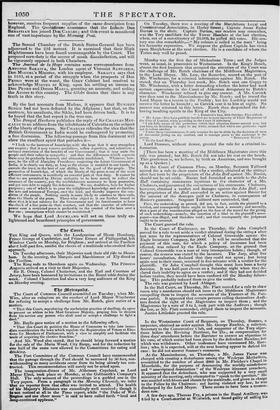Monday was the first day of Michaelmas Term ; and
the Judges went, as usual, in procession to Westminster. In the King's Bench, almost the first business that occupied the attention of the Court was the challenge of Mr. Rotch chairman of the Middlesex Magistrates, to the Lord Mayor. Mr. Law, the Recorder, moved on the part of Mr. Winchester, for a criminal information against Mr. Rotch. He stated, that on Thursday last week, Mr. Rotch sent one Guppy to Mr. Winchester, with a letter demanding whether the latter had used certain expressions in the Court of Alderman derogatory to Roteh's character. Winchester refused to give any answer. A Mr. Carvick was then sent to the Mansionhouse by Mr. Botch; and he traced the Lord Mayor to a tavern in the Poultry, ; but his Lordship would not receive the letter he brought ; so Carvick sent it to him at night. No answer was returned to this letter. Rotch then despatched the fol. lowing insulting epistle to the King of the City.
1, Furnival's Inn, 30th October, Five o'clock. " MY Loan—You have publicly insulted me in your capacity of Chief Magistrate of the City of London, while presiding in the Court of Aldermen. " I am fully aware of the protection which that situation throws around you; but you have, by declining to reply to my letter, retused that which one gentleman ought not to refuse another.
" Under these circumstances, it only remains for me to abide by the decision of men of honourable feeling on my conduct, and to consign yours to the contempt it de- serves. " BENJAMIN HUTCH." 'To the Lord Mayor."
Lord Denman, without demur, granted the rule for a criminal in- formation.
[ There has been a meeting of the Middlesex Magistrates since this rule was granted; but Mr. Rotch (lid not take his seat on the bench. This gentleman is, we believe, by birth an American, and was brought up as a Quaker.]
In the Court of Common Pleas, on Monday, Sergeant Talfourd moved for a rule to show cause why a verdict, obtained at the sittings after last term by the proprietors of the John Bull against Mr. Rosier, should not be set aside. Rosier had furnished an article to the John Bull containing statements injurious to the character of a Mr. Chalmers, and guaranteed the correctness of his statements. Chalmers, however, obtained a verdict and damages against the John Bull; and the proprietors of the Bull succeeded in an action against Rosier for the amount of the damages paid to Chalmers, in consequence of Rosier's guarantee. Sergeant 'falfourd now contended, that First, the undertaking as proved, did not, in fact, entitle the plaintiff to a verdict, and consequently there ought to have been a nonsuit ; and secondly, that a part of the consideration alleged on the face of the record for the giving of such undertaking—namely, the insertion of a libel in the plaintiff's news- paper—was illegal, and therefore void ; and that consequently the judgment ought to be arrested.
The Court granted the rule.
In the Court of Exchequer, on Thursday, Sir John Campbell moved for a rule to set aside a verdict obtained during the sittilips after last term by the representatives of Colonel Greswolde agains: the Eagle Insurance Company, for 50001. It will be recollected that the payment of this sum, for which a policy of insurance had been effected, was refused by the Eagle Company, on the ground that Colonel Greswolde WaS a man of very intemperate habits ; though, of course, the reverse was stated by the insurers. The Jury, after five hours' consultation, declared that they could not agree ; but being again sent to their room, returned in five minutes with a verdict for the plaintiffs. Sir John Campbell thought this must have been a hasty decision. It was half-past eleven on a Saturday night when they de- clared their inability to agree on a verdict ; and if they had not decided before twelve, they would have been confined till the Monday follow- ing. This probably induced them to give the verdict.
The rule was granted by Lord Abinger. In the Bail Court, on Thursday, Mr. Platt moved for a rule to show cause why a mandamus should not issue to the Middlesex Magistrates compelling them to inspect the accounts of the Trustees of St. Pan- cras parish. It appeared that certain persons calling themselves Audi- tors denied the right of the Magistrates to inspect them ; and the Magistrates by a vote of 3 to 1, took part with the Auditors ; though the law, as Mr. Platt contended, obliged them to inspect the accounts.
Justice Littledale granted the rule.


























 Previous page
Previous page